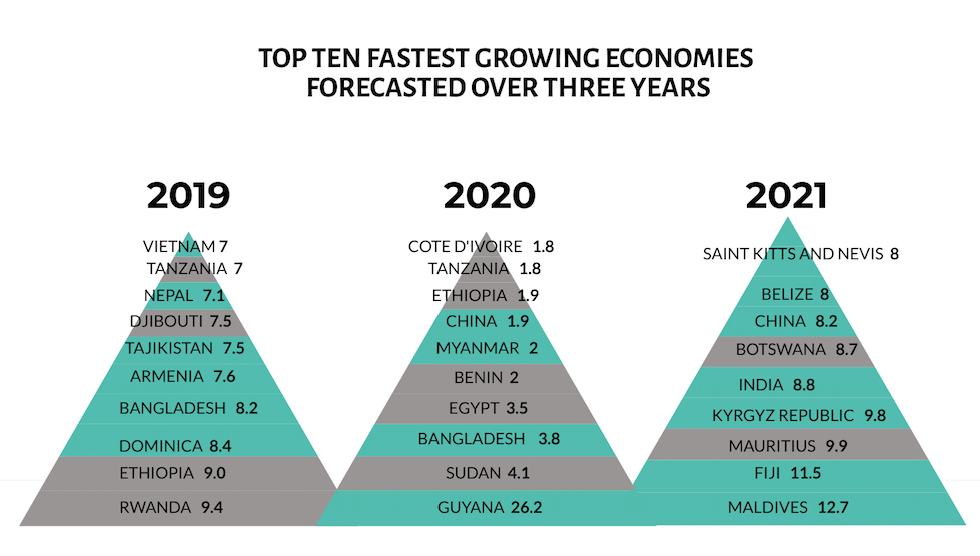This week, alongside our usual examination of COVID19 cases across Africa as well as support that other development partners are providing to African countries, we take an in-depth look at the recently published World Economic Outlook by the International Monetary Fund (IMF) to delve into African countries’ performances both pre and post pandemic times and what this means for COVID19 management in future, especially if a vaccine is not developed or made widely available in Africa’s 55 countries.
According to the IMF, in 2019, before COVID19 struck, four out of the top ten fastest growing economies were African. In 2020, the IMF estimates that so far six of the top ten fastest growing economies have been African. However, it seems with this latest prediction the IMF is less hopeful for 2021. While the IMF has forecast that 20 of Africa’s 55 countries will experience economic growth of over 4% in 2021, only 20% of the top ten fastest growing countries in the world will be in Africa. To put it differently, while in 2019 and 2020 IMF analysis suggests that Africa has overall had significantly higher growth rates than the rest of the world (3.3% and -2.9% for Africa; versus 2.2 % and -6.7% for the rest of the world in 2019 and 2020 respectively), the IMF now appear to believe that in 2020, Africa will only grow by 3.7%, but the rest of the world will grow by 4.3%.
This seems surprising given the recent experience, but does it really matter? What do these projected “lower growth rates” mean for COVID19 control measures in Africa?
Well whilst there might not currently be a “mass outbreak” across the continent, cases continue to fluctuate, with this trend expected to continue well into 2021. With the IMF projecting slower 2021 growth rates for Africa, we expect these fluctuations to be further exacerbated, resulting in Africa nations feeling under pressure to open their economies. This will subsequently make it more challenging to control the spread of COVID19 and stimulate further economic growth, producing a potential “vicious cycle”.
In contrast, at Development Reimagined, we have been tracking the spread of COVID19 in Africa and Asia since April, as well as government responses to the crisis, and on this basis believe African countries can be both resilient and stimulate economic growth by continuing to enforce certain restrictions, providing short term relief packages, alongside stimulating innovation. For example, in Mozambique, the Government directly targeted the poorest households, providing cash transfers and subsidies. Similarly to the case of Mozambique, Ethiopia set aside 0.6 percent of its GDP for emergency food distribution while in the case of Senegal, a million households saw received food aid and saw most of their utilities waivered. Uganda on the other hand, concentrated its efforts in ensuring its agriculture sector remained productive to ensure the nation is food secure. Finally, Rwanda provided door-to door services to vulnerable households delivering cash transfers and also providing agriculture support. These efforts have been instrumental in controlling the spread of COVID19 yet the economies are still forecast for high growth.
Despite the IMF slower growth projections, how can countries stimulate growth post COVID19?
The survival of some industries past the pandemic depends on the support offered by their respective governments and in the case of Mozambique, the IMF policy tracker reports how the government did in fact provide support to both micro-businesses and SMEs. Rwanda too provided support through the launch of a fund to support affected businesses with subsidized loans ensuring that they remain operational and Uganda provided funds directly to SMEs. Ethiopia directed its attention on maintaining foreign direct investment (FDI) ensuring that the export-import logistics continues to be operational. Furthermore, Ethiopia is working towards ensuring that industrial parks continue operating but putting the safety and well-being of the labour force first.
These initiatives from some of Africa’s fastest growing economies to date show it is possible to foster economic growth and grow resilience in the time of COVID19.

*** The End***
To find out how Development Reimagined can help you, your organisation or Government during the COVID-19 outbreak please email the team at clients@developmentreimagined.com .
Special thanks go to Rosie Wigmore, Rosie Flowers, Samu Ngwenya and Jing Cai for their work on the graphic and collecting/analysing the underlying data.
The data was collated from a range of sources including: government websites and media reports, the IMF policy tracker; the US Chamber COVID19 Dashboard; Our World in Data, Africa CDC and Worldometer. Our methodology is entirely in-house, based on analysis of spending, social distancing, income categories and other trends.
If you spot any gaps or have any enquiries, please send your feedback to us at DRteam@developmentreimagined.com, we will aim to respond asap.
October 2020


